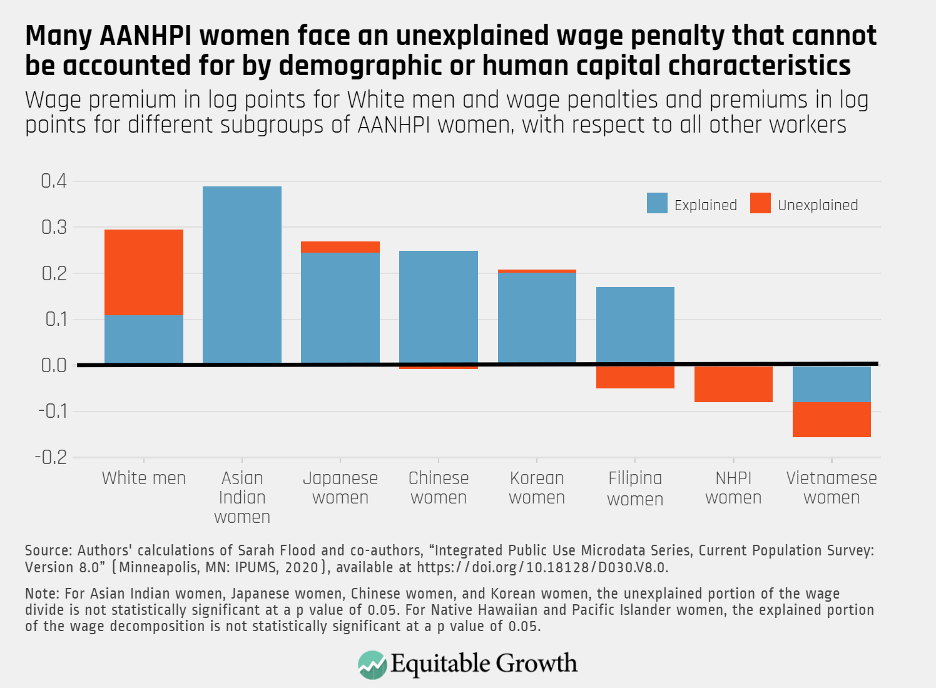Weekend reading: Studying the experiences of AANHPI communities in the United States edition
This is a post we publish each Friday with links to articles that touch on economic inequality and growth. The first section is a round-up of what Equitable Growth published this week and the second is relevant and interesting articles we’re highlighting from elsewhere. We won’t be the first to share these articles, but we hope by taking a look back at the whole week, we can put them in context.
Equitable Growth round-up
May is AANHPI Heritage Month in the United States, a period of time to commemorate the achievements and contributions of Asian Americans, Native Hawaiians, and Pacific Islanders. Kate Bahn and Carmen Sanchez Cumming look into the intersectional wage divides facing AANHPI women in the U.S. labor market, broadening the research in this area, which often obscures the difficulties this group of workers face in terms of employment, career advancement, and earnings. They examine racial, gender, and intersectional penalties that AANHPI women run up against in the workforce, and study what percent of these divides is due to explained or unexplained factors, the latter of which is typically assumed to be the result of discrimination. Bahn and Sanchez Cumming also note the importance of disaggregating data among subgroups of the AANHPI population, as there are many variations in the lived experience of, for instance, Asian American women of Indian and Chinese descent and those of Vietnamese descent or Native Hawaiians and Pacific Islanders. The co-authors close out their issue brief with actions policymakers can take to address these wage differentials and promote economic security for AANHPI women workers, their families, and their communities.
Every month, Equitable Growth highlights a group of scholars at the frontier of social science research in a series called Expert Focus. This month, Christian Edlagan, Maria Monroe, and I showcase the work and backgrounds of researchers across disciplines doing economic research on AANHPI populations and their lived experiences in the United States. Asian Americans are the fastest-growing racial or ethnic group in the country and face distinct challenges. They also have experienced a troubling surge in anti-Asian violence and discrimination during the coronavirus pandemic and recession. The scholars we write about this month are studying intergenerational mobility, wage equality, labor market participation, health and well-being outcomes, and the disparate impact of the coronavirus on AANHPI populations—while also highlighting the need for disaggregated data to more accurately capture the diversity of the many distinct Asian American subgroups in the United States.
New research looks into COVID-19 lockdown policies in the United States and their impact on consumer spending. Jacob Robbins summarizes the findings of his and co-author Raissa Dantas’ working paper on the decline and rise of retail and personal consumption amid the coronavirus pandemic and recession. They find that in the early weeks of the pandemic, fear of catching the coronavirus was the main factor driving consumer spending declines, rather than state- or city-imposed restrictions on behavior, such as stay-at-home orders. When fear of COVID-19 declined but these restrictions were still in place, spending on services directly affected—such as retail and restaurants or other in-person services—remained depressed. This indicates, Robbins writes, that the public health restrictions had their intended deterrence effect and worked to reduce the spread of the virus. The Biden administration should therefore continue its long-term focus on fighting the pandemic rather than putting policies in place that may harm workers and consumers in exchange for short-term Gross Domestic Product gains.
Anticompetitive behavior in the pharmaceutical industry often leads to higher prices for consumers and fewer options in the form of generic competitors to brand-name drugs. But in 2019, Congress passed the bipartisan CREATES Act, which has thus far worked to stop two of these anticompetitive practices and pave the way for generic manufacturers to open up the marketplace. Michael Kades explains the two behaviors—sample blockades and safety protocol filibusters—that the CREATES Act addresses and how they have been used in the past to hamper efforts to create generics and biosimilars. He also discusses how the CREATES Act deters these actions, and other bipartisan measures Congress can take again to prevent other anticompetitive pharmaceutical industry practices such as pay-for-delay settlements and citizen petition abuse.
Links from around the web
Aggregate economic data are misleading and often do not tell the whole story of how most people are experiencing the economy or economic growth. This is true of Gross Domestic Product and of many other economic indicators that are commonly used in the United States. Marketplace’s Kai Ryssdal and Richard Cunningham explain why breaking down the data works to create equitable policy and target those policy interventions to the populations that really need the support. Ryssdal talks to Rhonda Vonshay Sharpe about how breaking down these data can achieve these goals, particularly amid the coronavirus recession and recovery, which has disproportionately affected women and people of color in the United States. Equitable Growth’s Austin Clemens and Michael Garvey recently explained why disaggregated data is needed as a result of structural racism’s enduring legacy and the disproportionate impacts of the coronavirus recession on people of color. Christian Edlagan and Raksha Kopparam also recently discussed the importance of disaggregating data on AANHPI workers amid the coronavirus pandemic.
Register for an upcoming event on economic data disaggregation

Supply-side economics alone has been proven ineffective at growing the U.S. economy and creating jobs. It must be accompanied by government investment in infrastructure—and, as Alan Blinder writes in an op-ed for The Wall Street Journal, that includes the care economy. Areas such as pre-Kindergarten, child care, and paid leave would all but guarantee high returns for the government’s investment in the form of increased human capital and improved economic and health outcomes for workers and their families. The Biden administration understands that these areas are badly in need of investment, Blinder continues, and has included them in the American Jobs Plan and American Families Plan proposals to Congress. “Opponents of programs like these often denigrate them as ‘socialism’,” Blinder concludes. “I like to praise them as real supply-side economics.”
Some employers are complaining these days about the difficulties of hiring workers, yet at the same time they are offering too-low wages, removing hazard pay, or not taking action to protect workers’ safety amid the public health crisis. Vox’s Anna North looks at how work has transformed in the past year, for both those in-person occupations deemed essential and for the workers who transitioned to clocking in remotely. North examines the various practices that were implemented to navigate the coronavirus and how they are slowly being withdrawn by employers—perhaps prematurely, as coronavirus cases continue to spread and deaths from COVID-19 still are a daily occurrence, albeit at a lower rate than for most of the pandemic. This has led some workers to hesitate to go back to work and sometimes even to strike or protest to demand more protections and higher wages.
Friday figure

Figure is from Equitable Growth’s “The intersectional wage divides faced by Asian American, Native Hawaiian, and Pacific Islander women in the United States,” by Kate Bahn and Carmen Sanchez Cumming.

